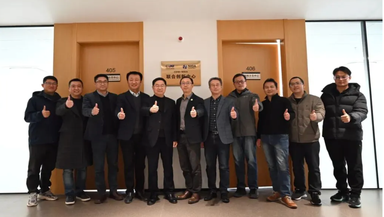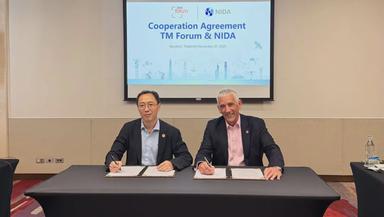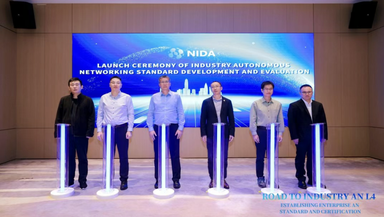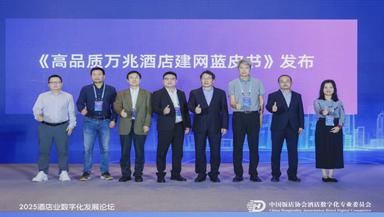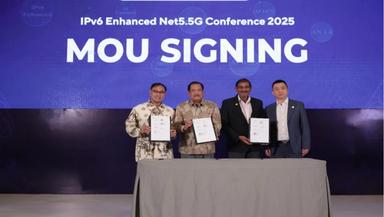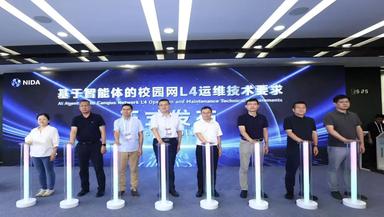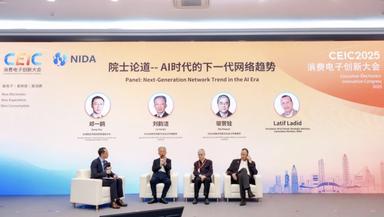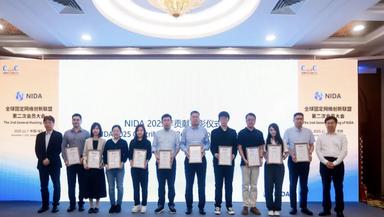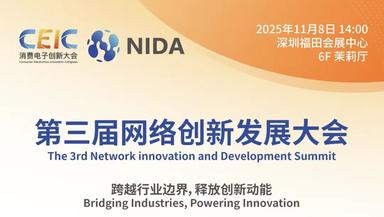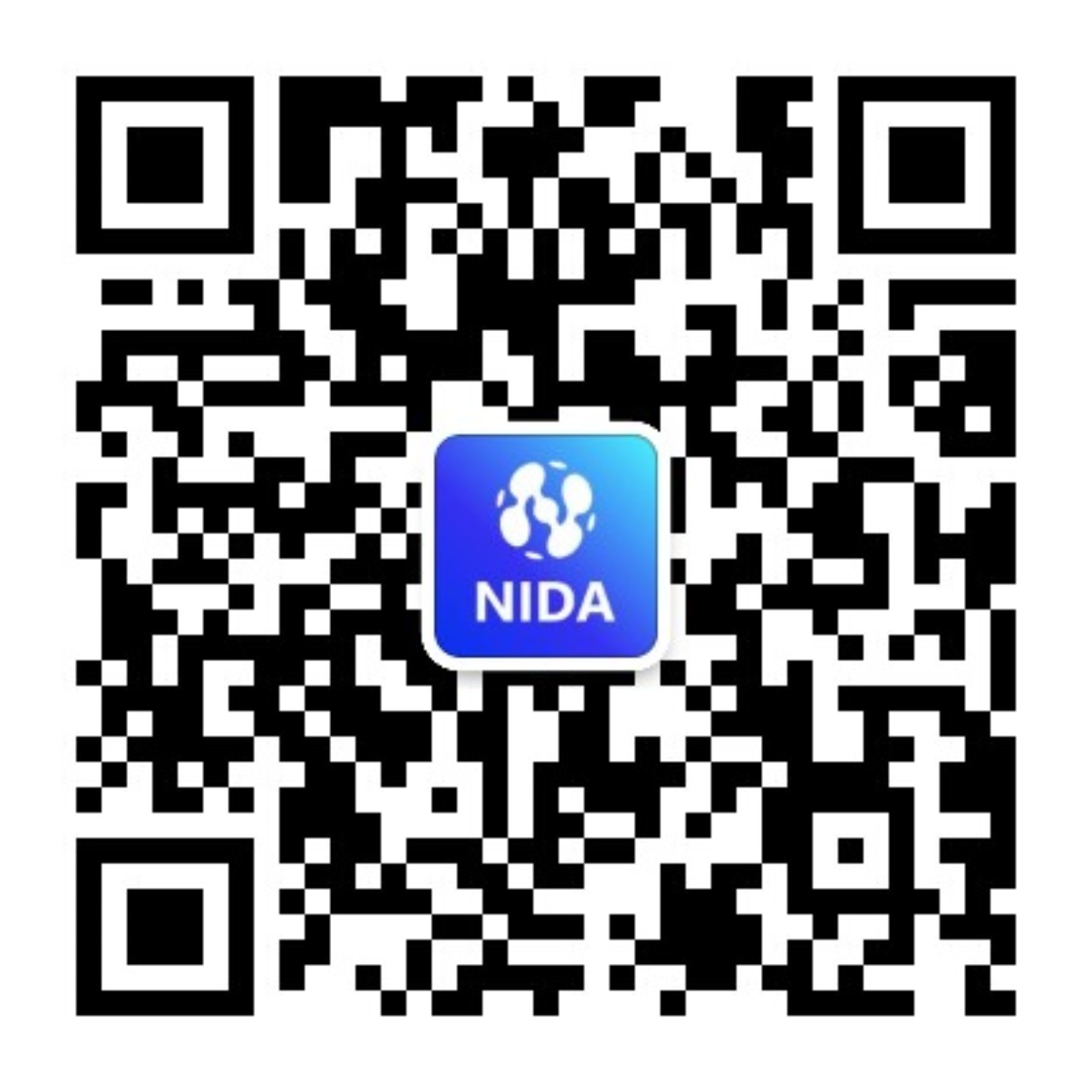3rd Network Innovation Conference Concludes Successfully
[Shenzhen, China, November 8, 2025] The 3rd Network Innovation and Development Conference kicked off at 14:00 on November 8 at the Shenzhen Convention and Exhibition Center. Hosted by the Network Innovation and Development Alliance (NIDA), the conference themed "Bridging Industries, Powering Innovation" gathered representatives from government departments, basic telecom operators, equipment manufacturers, universities and research institutions to jointly explore the development trends and industrial practice paths of next-generation network technologies.Wu Hequan, a special expert of the NIDA Strategic Advisory Committee meeting, attended and delivered a speech. He pointed out that the evolution of information technology has entered a new inflection point, with artificial intelligence advancing from algorithm innovation to systematic application across society. The network will shift from "connecting people" to "connecting intelligence", and the interconnection and collaborative intensification of intelligent agents have endowed the next-generation network with new connotations. The network evolution in the AI era is not only a technical issue but also a systematic one. He called on all industrial parties to work together to find the "greatest common divisor" for network development and build an open and win-win ecosystem.Denny Setiawan, Director of the Directorate of Digital Infrastructure Policy and Strategy, Ministry of Communications and Digital of the Republic of Indonesia, stated in his speech that China has built advanced network infrastructure and set a benchmark for the global digital economy. He expressed the hope of learning from China's mature experience, driving national economic growth through the development of the network industry, promoting more inclusive and sustainable development, creating more jobs, and improving people's quality of life. Ao Li, Chief Engineer of the China Academy of Information and Communications Technology (CAICT), interpreted the "Next-generation Network Insight Report (2025)". He pointed out that as a key carrier of new-quality productive forces, the "next-generation network" relies on technologies such as IPv6/IPv6+ to achieve ubiquitous connectivity of "connecting computing, intelligence, data, and space", which can build a safe, intelligent, efficient, and green network system, providing important guidance for the ecological construction and development of the industry. In the "Academician Dialogue" session, academicians from home and abroad gathered to discuss the trends of next-generation network in the AI era. Wu Hequan proposed that the next-generation network is mainly reflected in the "Four News": ultra-broad new connections, new IPv6 protocols, new network intelligence, and new security mechanisms. To develop the next-generation network, the most urgent task at present is to establish clear, pursuable and achievable goals, mobilize various vertical industries to become the main players, and enable all industries across the country and even the world to reach a consensus, thereby establishing an ecosystem and then promoting technologies to application. Liu Yunjie, Academician of the Chinese Academy of Engineering, stated that AI and networks will achieve two-way driving, and network development needs to meet the "Three Highs and Three Lows" requirements of "high speed, high quality, high efficiency, low cost, low energy consumption, and low threshold". He emphasized the need to accelerate the improvement of integrated computing power scheduling infrastructure and promote technology implementation and application. Latif Ladid, president of the IPv6 Forum, pointed out that IPv6 brings more possibilities for network development, and the world should accelerate the transition to IPv6. Governments and enterprises need to focus investment in this field to jointly build a stronger network infrastructure.The industry leaders participating in the roundtable reached a basic consensus on the key technologies and development evolution direction of the next-generation network, believing that the academic and industrial circles need to continuously expand consensus, form a joint force, and jointly promote the arrival of the next-generation network.To build consensus, accelerate standard innovation, and lead industrial development, industrial leaders from home and abroad jointly launched the "Initiative for Next-generation Network Industry Collaboration" during the conference. Wu Hequan, Liu Yunjie, Latif Ladid, Ao Li, Dr. Ahmed Darwish, Former Egyptian Minister of State for Administration Development and Chairman of the Suez Canal Economic Zone, Teguh Prasetya, Chairman of the Indonesia IoT Organization (ASIOTI), Ulugbek Azimov, Deputy Director of the Uzbekistan Institute of Information and Communication, Shavkat Sabirov, Chairman of the Kazakhstan Internet Association, Adolfo Borrero, President of the AMETIC Smart City Committee of Spain, Fu Zhiren, Vice President of China Telecom Research Institute and Vice Chair of NIDA, Tang Xiongyan, Vice President of China Unicom Research Institute and Vice Chair of NIDA, Tan Hang, Executive Vice President of Jiangsu Future Network Innovation Research Institute and Vice Chair of NIDA, Gan Bin, Vice President of Huawei Technologies Co., Ltd., Shi Weiqiang, Vice President of ZTE Corporation and Vice Chair of NIDA, Cheng Weiqiang, Deputy Director of the Basic Network Technology Research Institute of China Mobile Research Institute, and Deng Yiou, Secretary-General of NIDA, jointly participated in the ceremony. The initiative will accelerate the technological innovation and industrialization process of the next-generation network and help build a strong network country.The "Standard Practice" session achieved fruitful results. The establishment of NIDA 400G per lane MSA and NIDA Security Working Group will provide important support for related technological research and development and industrial application. Experts from China Telecom Research Institute, China Unicom Research Institute, and China Academy of Information and Communications Technology successively interpreted and released the "Technical Requirements for Metropolitan Area Network Construction Oriented to Computing Power Services", innovative achievements of self-intelligent network change and security agents, and L4 self-intelligent network construction standards, demonstrating China's leading practices in self-intelligent network technology and standards. At the same time, remarkable progress was made in the standardization of industry applications. The conference interpreted and released relevant park, metropolitan area, DCN, and AN network construction standards for the medical and education industries, and launched the "Self-Intelligent Network Empowers Industry Pioneer 100 Practice Launch Ceremony" and the "Wireless Intelligent Perception Industry Ecosystem Construction Initiative", aiming to promote the in-depth integration and innovation of network technology with vertical industries and accelerate the intelligent deployment process of vertical industries.The "Pioneer City" session focused on the integration of network innovation and urban development. Chen Gang, Director of the Industrial Internet Business Department of Jiangsu Future Network Group Co., Ltd., shared Nanjing's practice of promoting new infrastructure with the "New Three Connections and One Leveling" as the core. By building a new network plane and laying out computing power centers, it has effectively supported the landing of emerging businesses such as AI large models and cross-regional medical care. Adolfo Borrero, President of the AMETIC Smart City Commission of Spain, brought an international perspective on overseas smart city construction. He emphasized that next-generation network, Wifi7, AI and other technologies provide new opportunities for smart city development. Spain will focus on technological research and development and scenario landing to promote breakthroughs in smart tourism, efficient energy utilization and other fields.The "Pioneer Cities" session focused on the integration of network innovation and urban development. Mr. Chen Gang, irector of the Industrial Internet Division at Jiangsu Future Network Group Company, shared Nanjing's practices in promoting new infrastructure with the "New Three Links and One Leveling" at its core. By constructing a new type of network plane and deploying computing power centers, among other measures, it effectively supports the deployment of emerging services like large AI models and cross-regional healthcare. Mr. Adolfo Borrero, Chairman of the AMETIC Smart Cities Commission from Spain, provided an international perspective on overseas smart city construction. He emphasized that next-generation network, Wi-Fi 7, AI, and other technologies provide new opportunities for smart city development. Spain will focus on technology R&D and scenario implementation to promote breakthroughs in areas like smart tourism and efficient energy use.In the subsequent roundtable discussion, representatives from Kazakhstan, Uzbekistan, Indonesia, Egypt, and Spain conducted in-depth discussions on the development of next-generation network in urban construction, pointing out that urban-rural digital divide, bandwidth limitations, talent shortages, and international standard coordination are common global challenges. The participating guests unanimously agreed that it is necessary to strengthen transnational cooperation and policy support, promote the deployment of intelligent networks such as IPv6 and 5G, so as to seize the opportunities of the AI era and achieve a safer, more efficient and sustainable interconnected future. At the end of the conference, the " Next-Generation Network Pioneer City 2026 New Chapter Launch Ceremony" was launched, jointly initiated by 10 cities from 9 countries: Shenzhen, Nanjing, Malaysia, Kazakhstan, Uzbekistan, Brazil, Indonesia, Spain, Egypt, and Saudi Arabia. This indicates that countries will deepen cooperation in technological innovation, standard coordination and other fields to help the high-quality development of smart cities. Dr. Ahmed Darwish, Former Egyptian Minister of State for Administration Development and Chairman of the Suez Canal Economic Zone, Denny Setiawan, Director of the Directorate of Digital Infrastructure Policy and Strategy at the Ministry of Communications and Digital of the Republic of Indonesia, Ulugbek Azimov, Deputy Director of the Uzbekistan Institute of Information and Communication, Shavkat Sabirov, Chairman of the Kazakhstan Internet Association, Adolfo Borrero, President of the AMETIC Smart City Commission of Spain, Navaneethan C Arjuman, Chairman of APAN IPv6&5G WG and Member of NIDA Expert Committee, Xue Wu, Vice President of Huawei Data Communication Product Line, Feng Jun, Chief Engineer of ZTE Bearer Product Line, Chen Gang, Director of the Industrial Internet Business Department of Jiangsu Future Network Group Co., Ltd., Wu Lingbo, Director of the Network Construction Department of Shenzhen Smart City Communications Co., Ltd., and Deng Yiou, Secretary-General of NIDA, participated in the launch ceremony.The successful holding of this conference has further clarified the technical development direction and industrial promotion path of the next-generation network. In the future, with the breakthrough of technological innovation in the next-generation network, the continuous improvement of industry standards, and the in-depth expansion of application scenarios, the next-generation network will accelerate the reconstruction of the network ecosystem, empower the intelligent upgrading of cities, and inject a steady stream of power into the high-quality development of the digital economy.
